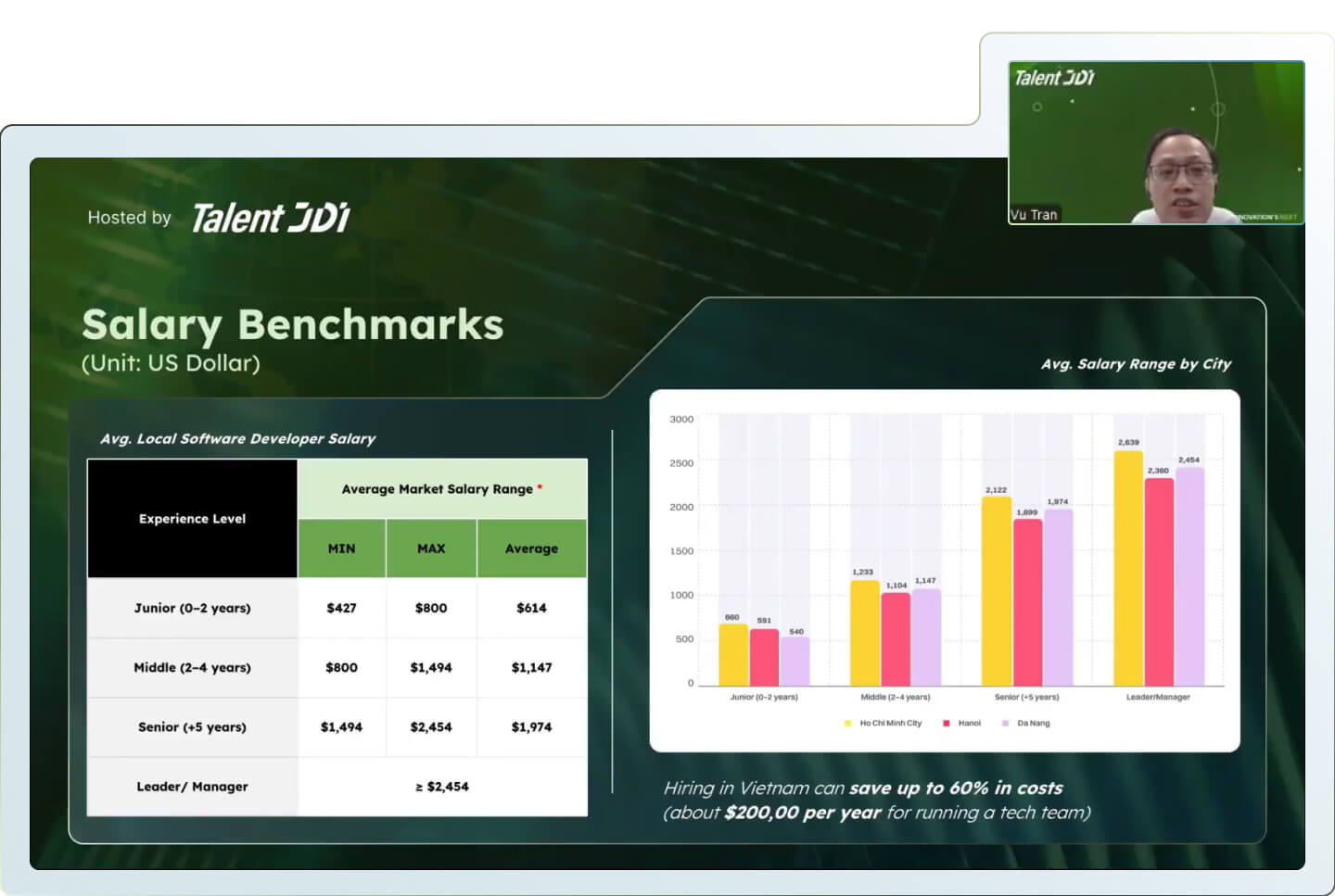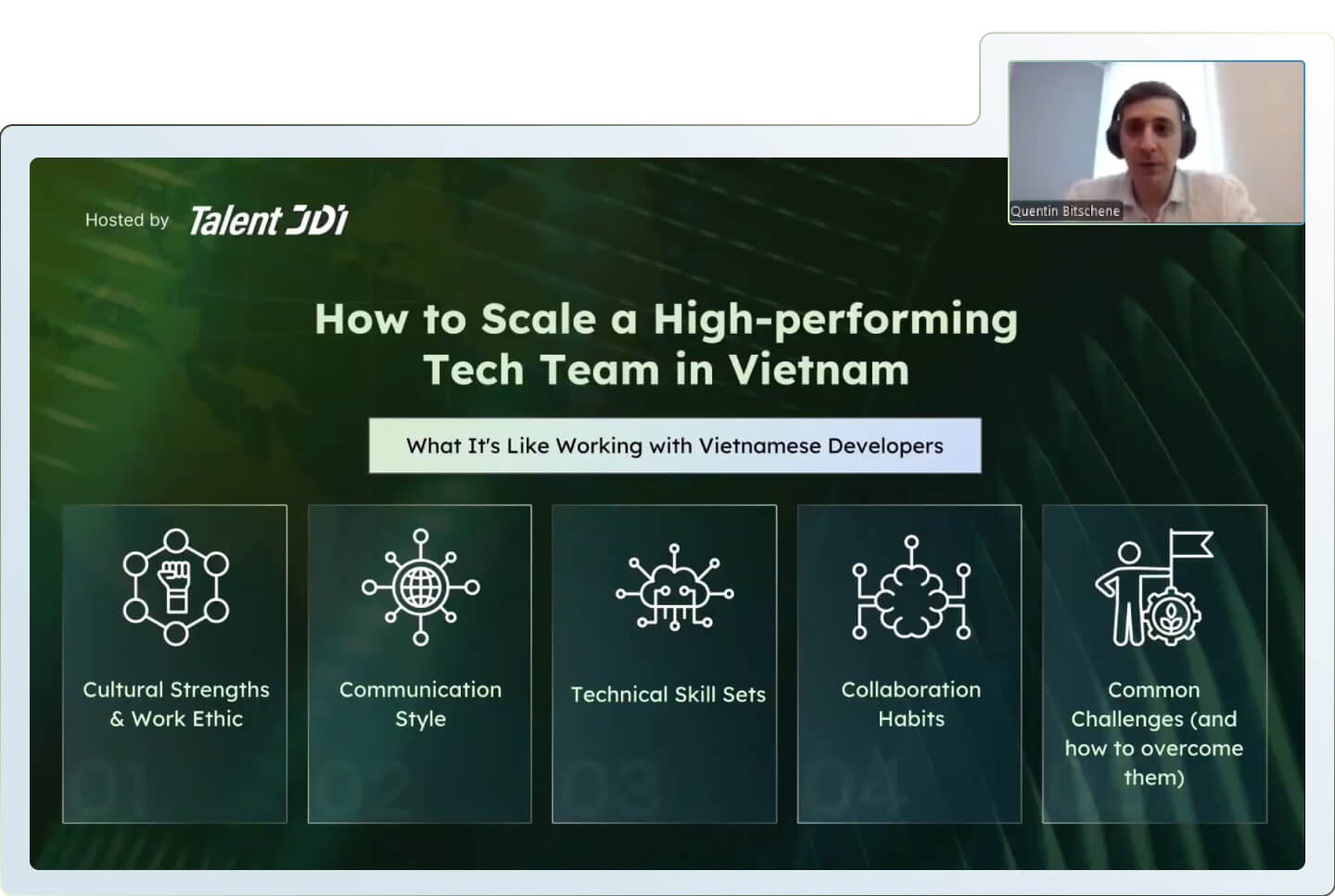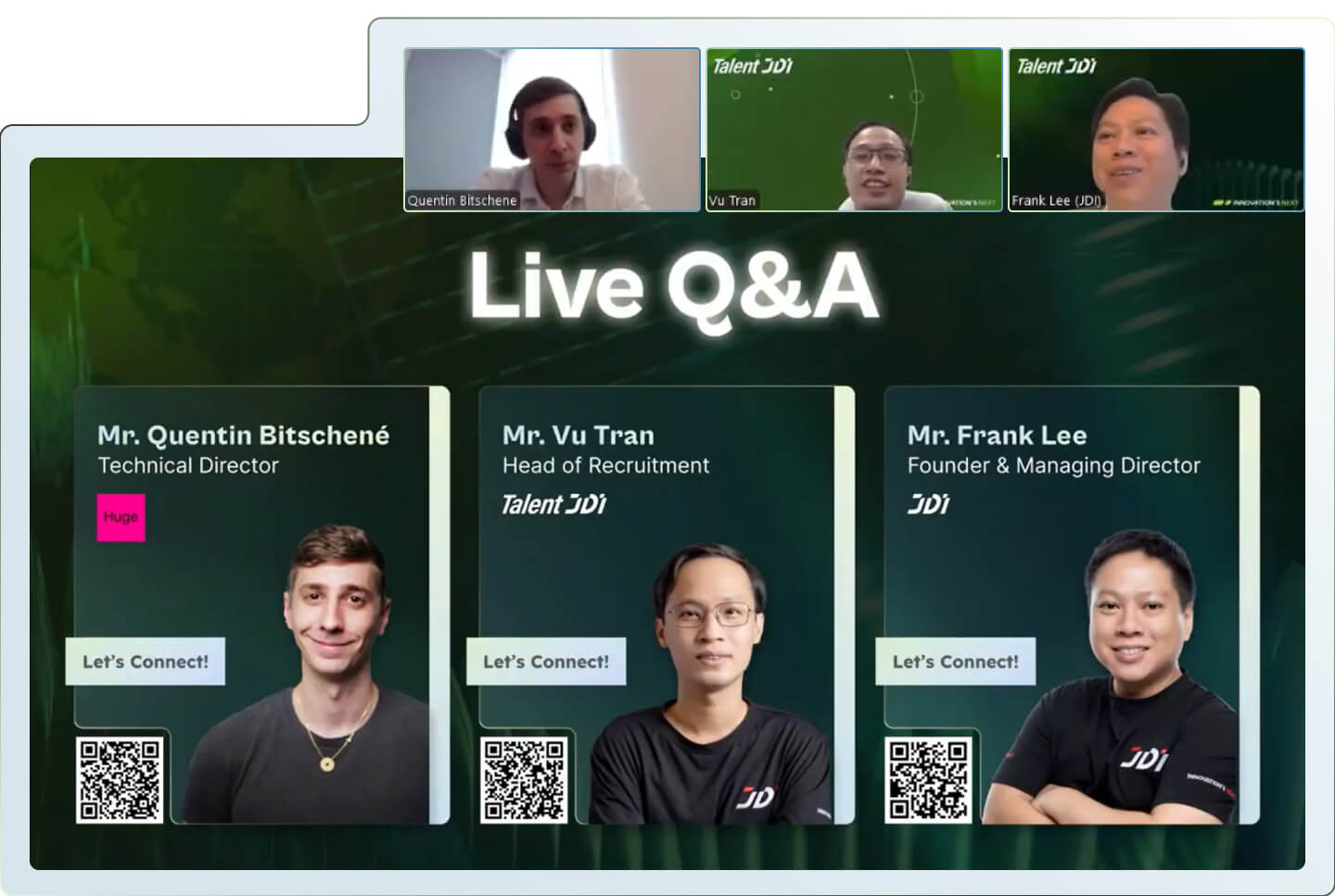
Webinar Recap — Seek Talent: Professional, Reliable Developers & Where to Find Them
AUTHOR
Talent JDI
READ TIMES
1 minutes
LAST UPDATED
Nov 17, 2025
On June 18, we hosted a special webinar, “Seek Talent: Professional, Reliable Developers & Where to Find Them,” attracting tech leaders and hiring managers across the region. The focus? How companies can build and scale high-performing engineering teams efficiently—without compromising on quality or blowing up their budgets.
If you couldn’t attend the live session, don’t worry. Below is a summary of the key insights shared by our speakers, along with practical strategies you can apply when expanding your tech team, particularly in Vietnam.
Meet The Speakers
Our speakers brought real-world experience from years of building and leading cross-border tech teams:
- Frank Lee, Founder & Managing Director at JDI, who has scaled product teams based entirely in Ho Chi Minh City
- Vu Tran, Head of Recruitment at Talent JDI, who has worked with hundreds of companies navigating Vietnam’s tech hiring market
- Quentin Bitchené, Technical Director at Huge, with hands-on experience leading teams across Vietnam and Singapore
Each speaker provided a grounded perspective on Vietnam’s developer ecosystem—what works, what to expect, and how to approach it with the right mindset.
Key Takeaways From the Session
✅ Vietnam’s Tech Talent Pool is Bigger—and Better—Than You Might Expect
Vietnam is home to a fast-growing population of young, well-trained developers. Thousands of new IT graduates enter the workforce every year, many of whom are eager to learn, fluent in English, and comfortable with modern technologies. The cities of Ho Chi Minh City, Hanoi, and Danang serve as the country’s primary tech hubs.

✅ It’s Not Just Talent. It’s Also About Value.
According to Vu, hiring developers in Vietnam can reduce your costs by 40%–60% compared to Singapore, China, or India. A senior software engineer may cost around $2,900/month, while a full-stack team of four (including QA and AI roles) is roughly $9,900/month, fully loaded. This includes competitive salaries, benefits, and operational overhead.

✅ Code Quality Without Micromanagement? It’s Possible.
Quentin explained how his teams balance delivery speed and technical excellence by investing in training, blending in global best practices, and giving developers autonomy. His leadership approach? Build trust, give space, offer support, and coach, don’t control.

Want to dive deeper into what our speakers shared? Watch the full webinar to gain their insights—access the recording here.
Live Q&A Highlights With Our Attendees

Q1: Why should I choose Vietnam over China or India when the cost is nearly similar?
Frank: I think it’s because the cost in China isn’t low anymore. If you go to a tier-1 city, the salary levels are now comparable to Singapore, which makes them less attractive. Meanwhile, many of our clients have found Vietnamese developers to be more productive, inquisitive, and hard-working.
About India, there was a case where a company struggled to maintain development quality there. Plus, skilled Indian developers are now commanding higher salaries compared to Vietnam.
Q2: Talking about Vietnam’s culture, should we offer them a 13th-month bonus to stay competitive?
Quentin: This is what we planned from day zero when we ran a hiring campaign. The cost will include other components and, of course, the 13th-month bonus; that should definitely enter into your consideration (when hiring).
Vu Tran: In addition to the employee benefits, there are other packages, such as a training bonus that a company can consider providing to its employees in Vietnam.
Q3: Is it recommended to do exchange programs between countries for the technical teams? For example, those in Singapore going to Vietnam for six months to set the standards and ensure smooth communication/ responsibility, etc.?
Quentin: Absolutely. I think it’s safe to say it is more than recommended; it’s pretty much about monetary if you want to build the relationship you expect from developers working in Singapore to collaborate with your team in Vietnam.
You need to build that trust, and some of that goes through sending your teammates to Vietnam for a couple of weeks. For myself, I also travel to Vietnam every 8 weeks.
Frank: If it’s about outstationing your Singapore team to Vietnam in the first six months, another question arises: is it possible to have every Singaporean developer there? Most of the time, the answer is no.
So, what happens then? Maybe they can fly to Vietnam once every month, or send different team leads over there. The thing is, the more interaction, the better it is.
Q4: Do we have recommended practices for hiring software engineers with good English communication?
Vu Tran: As you may know that English has become extremely important, almost a must-have for fresh graduates in Vietnam nowadays, meaning the younger developers tend to have good English proficiency. Yet, the senior roles may encounter challenges.
First thing to do it’s to define clear English requirements and specify the level of proficiency needed. Next, we should decide if all team members should have strong English or just the lead manager.
(The most common practice in Vietnam is that the lead will handle communication with headquarters, while the rest focus on technical work.)
I recommend doing interview rounds in English so we can evaluate their skills. Plus, the company should also consider upskilling opportunities like English training.
Q5: I’m worried about quality control. How do we ensure the code and architecture meet our internal standards without micromanaging?
Quentin: For Huge, we started with hiring 2 QA engineers in Vietnam and doing a mixed team with Singapore. We coached the people to the point where we’re very satisfied with their work and they could work on their own. From then on, we started to scale up and rely completely on our QA team in Vietnam.
So my recommendation for code quality is to start with a mixed team. If you’re looking to transition your local team to Vietnam, you can do that over time fairly safely.
Q6: I’ve seen BA and project managers taking the role of spokesperson in English, whereas engineers are limited in English. Is it recommended, or should we do without a BAPM and rely only on the tech lead who can speak English?
Vu Tran: From my experience, having a BA or a project manager as the spokesperson is recommended. But if the project is highly technical, the tech lead should also be fluent in English so they can engage directly in technical topic discussions.
Q7: Can you give additional advice on how you seek talent to the attendees?
Frank Lee: Just do it. It’s better to start earlier and experiment with a small team first to gain confidence before you go with a bigger exposure to Vietnam itself.
Quentin: It is a very exciting market in general, there’s no doubt that you will find the right people for the jobs you have in mind.
Vu Tran: Whether you want to expand your team, enter Vietnam for the first time, or don’t understand the market very well. Please feel free to contact Talent JDI, we’ll be very glad to support you.
Want the full Q&A and all the live discussion? Watch the complete webinar record here.
Access Bonus Resources to Plan Your Next Offshore Hire
Our webinar wrapped up on a high note—packed with practical insights, thoughtful discussions, and engaging questions from attendees.
We’re grateful to everyone who made the session possible—from our expert speakers who brought real-world experience, to the audience whose energy helped shape a meaningful conversation.
To support your next steps, we’ve put together a set of curated resources designed to help you build or scale your tech team with confidence, including:
.jpg)
Wanting To Hire Offshore Developers In Vietnam?
Feeling stuck figuring out how to start? Companies working with Talent JDI scale twice as fast—and often save $200K+ annually.
With access to over 16,000 pre-vetted tech professionals, we help you build your team fast. From first interview to final onboarding—we handle the details so you don’t have to.
Ready to make your offshore team a reality? Drop us a note, tell us what you need, and we’ll make it happen.
